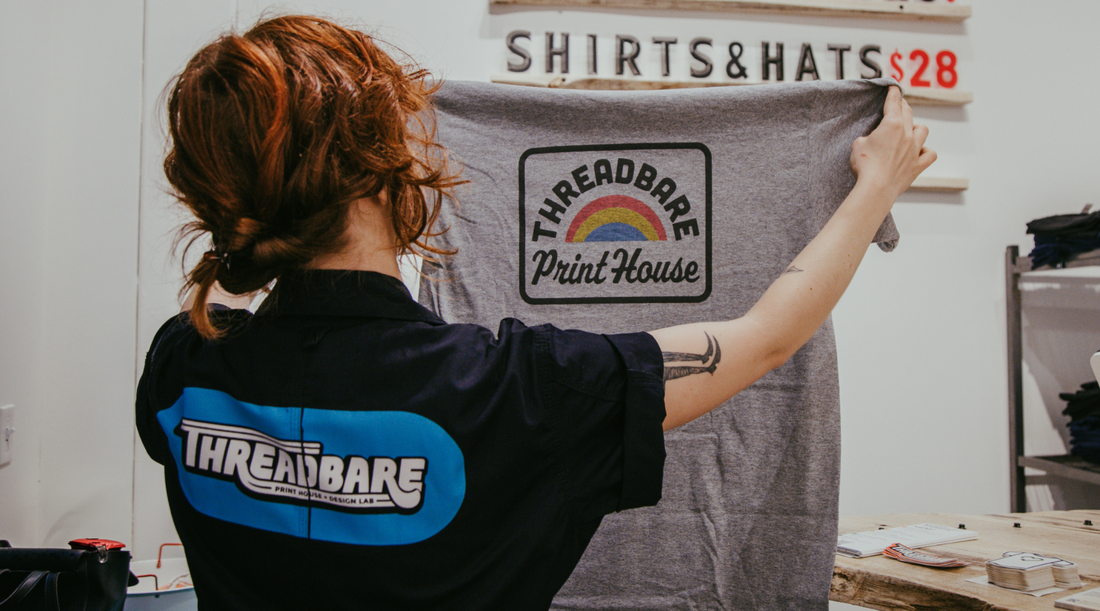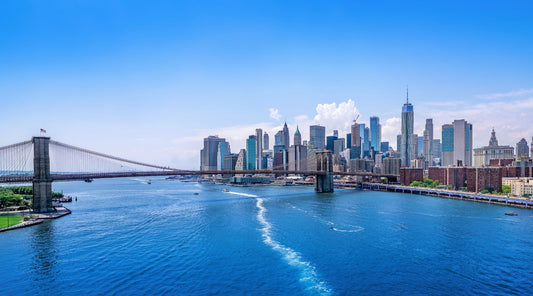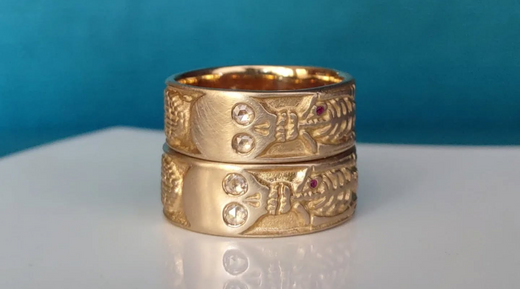Amy Baker started screen printing out of her garage in Eugene, Oregon in 2012. What started as a tiny endeavor spearheaded by one woman's drive and dreams has now grown into Threadbare Press, a thriving multi-service design and print shop with two locations.
Through Amy's hard work, her sustainably-minded business has become a cornerstone of the Eugene community, serving individuals, organizations, and businesses alike.
Our social media manager had the pleasure of touring their Washington Street location, as well as sitting down with Amy to talk about her experience running Threadbare Press. Watch or read our interview below!
Responses have been edited slightly for brevity and clarity.
Featured image is owned by Threadbare Press and has been used with their permission.
ECOBAGS:
What drove you to open a multi-service print and design shop in Eugene, Oregon?
Amy:
I started this in my garage 13 years ago. I had always liked graphic t-shirts, and I was really curious about the process of screen printing. So in the beginning I was just very self-taught, a very slow, slow process of trying to learn how to screen print in the garage.
And then, as I got more skills and more connections and found information on YouTube, then it just got really exciting to be able to, you know, come up with t-shirt graphics and screen print them.
It's really satisfying, and that's what I like about it so much, in that it's fairly easy, entry-level, to do stuff in your garage and still produce t-shirts.
Yeah, it's satisfying.
ECOBAGS:
What was the biggest hurdle you faced when you were first starting your business, and how has that experience shaped how you approach your business's growth today?
Amy:
I just didn't have the right equipment or knowledge, and it can be really frustrating. So I think what happened was I made connections in the industry and started talking to people that screen print, and getting that help and those tips from other people that were willing to share knowledge, and it didn't feel like competition or something.
That was super helpful, so still even now we get quite a few people who are wanting to learn how to screen print and have a little setup in their garage, and I think by far the hardest part of that situation is the actual screen burning part. Because without the exposure unit to burn the screens, it can be very trial and error over a lot of time.
So I always tell people that if they want help, we burn screens for people that print at home quite a bit - just to take that difficult side of it, because it's hard enough to even just learn the technique of screen printing, but then (there's) the setup and equipment.
So yeah, we still troubleshoot with people and I like to help people learn how to screen print, and I like how excited people get!
It reminds me of how excited I used to be about it.
ECOBAGS:
We love that you employ a multitude of sustainable practices with your business, like materials recycling and reusing misprints (among many others). What pushes you to keep finding ways to lessen your business's impact on the planet, and do you have any new initiatives you're working towards for 2025?
Amy:
I mean, I just don't think you can be in business and not have a sustainability initiative.
This garment production world is very toxic and polluting. You know if you take everything from just the fashion industry and all the clothing, I mean, behind oil it's like the second most polluting.
And I want to be in business, and I love this business! So you know, (I'm) trying to lessen that impact and educate myself and the people that work here, and (I) try to learn from the bigger companies that are out there going to India and figuring out how to do organic cotton, and you know, doing the research, trying to learn and absorb as much from the industry as possible.
It's just really important on a personal level to even feel like, you know, what are we contributing to the world and how can we help a little bit?
This year we finally put in a filtration system in our washout booth. So that really helps. It has like five different filters that everything goes through, so that our wastewater is clear, (we're) sending clear water to the waste stream. So that was a big one.
The next thing we want to do someday would be to get a direct-to-screen setup. So right now, we're still doing the old method of we have to print out plastic film in order to burn a screen. And there's a new technology that eliminates that. So the plastic film is one of the - that's probably the biggest waste that we produce in this small little print shop.
So working towards eliminating that and just as we grow, keeping in mind that sustainability is important. That helps guide decisions around what equipment to buy.
ECOBAGS:
Threadbare Press is a women-owned and largely women-operated company, is this an intentional decision? If so, tell us more about what sparked this intention.
Amy:
It was not intentional! I'm really lucky that we have mostly women working here. It wasn't necessarily intentional but maybe it's easier for women to gravitate towards a new industry when I am a female business owner, and maybe that can be less intimidating, I don't know.
I would like to have more diversity. When I have a chance to hire again, we have previously hired through a program that supports adults with disabilities and so I'd like to get back to that initiative.
I just think that it's not intentional, but it's certainly a nice perk. And so often in this industry, or in this business, the people that I hire don't necessarily have experience so that makes it maybe a wider pool to grab from.
ECOBAGS:
How do you ensure that your business is an ethical, enjoyable, and empowering place to work at?
Amy:
I've had to learn a lot over the years since the garage days when I started out with just me. Having employees is necessary and sometimes challenging, but I think the way everyone feels the most secure is by having structure in place.
Things like a really good employee manual and solid safety measures, things like that I didn't really think about when it was just me. As I've grown I've been able to put those kinds of things in place. People like communication, people like things to be clear, everybody wants to know their job and get in their lane and know what to do.
So much of managing people is trying to make sure everyone has the resources they need, that I'm available to them, and that the job is as clear as possible. Everyone here wears so many hats and we're a pretty small business (there are only five of us now), so people have to rotate around a bit.
That can be good because then your job can be different every day and (you) learn new skills, and it can be really fun. But it's also not pushing a button every day, so sometimes people are learning on the job or needing to ask questions, and it can definitely add to it. It's a creative work environment, and people enjoy working in a creative outlet.
ECOBAGS:
Your business has been involved with quite a few social and environmental justice groups in the past, like the Eugene’s Women’s March and ShelterCare. Do you have any favorite projects or moments that have really made an impact on you and your business over the years?
Amy:
The first Women's March, the big one, the day before we opened up our doors and just said "We have a few designs, bring us a t-shirt, we're just taking donations to Planned Parenthood, it's free."
And we just had a line out the door, and people were emotional, people were kind of nervous about the Women's March the next day (nobody knew how it would go off), and people were excited and supportive. It very much felt like Threadbare was part of the community.
That was a really exciting day that I won't forget.



